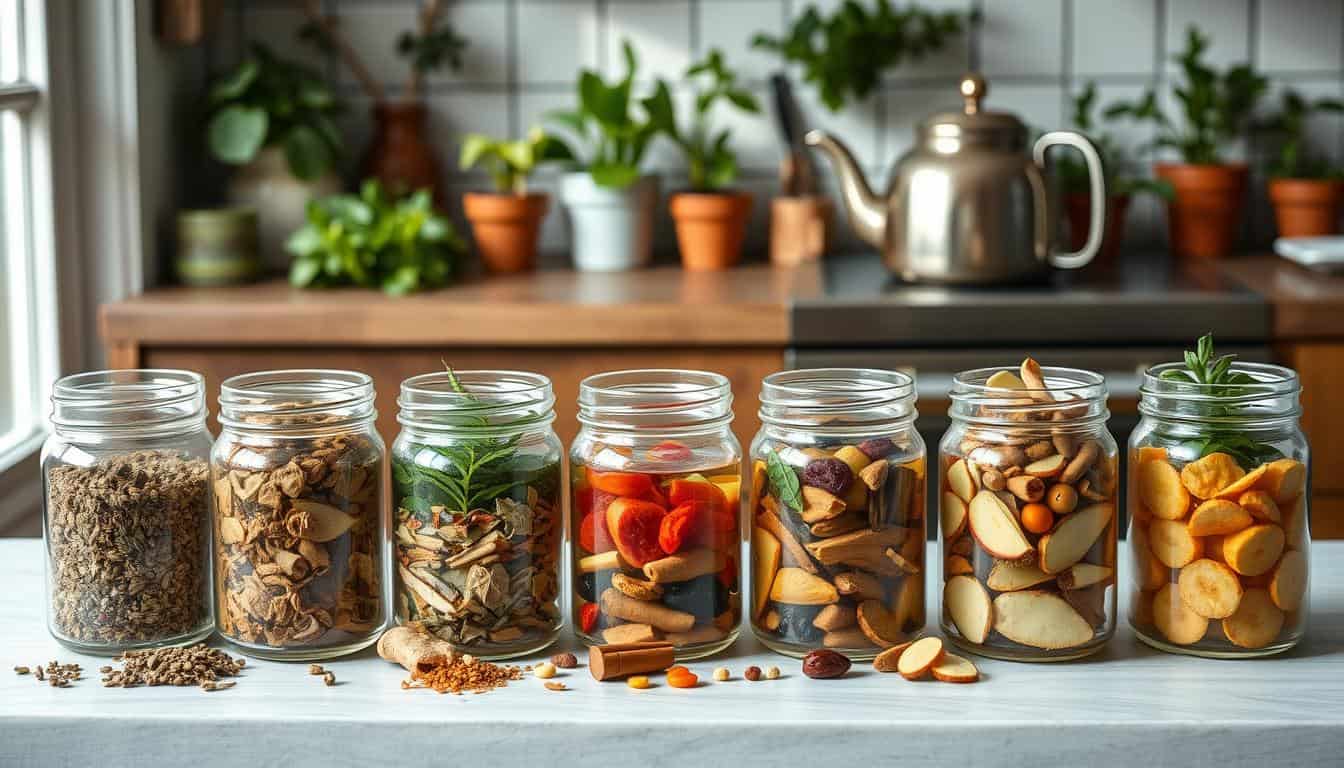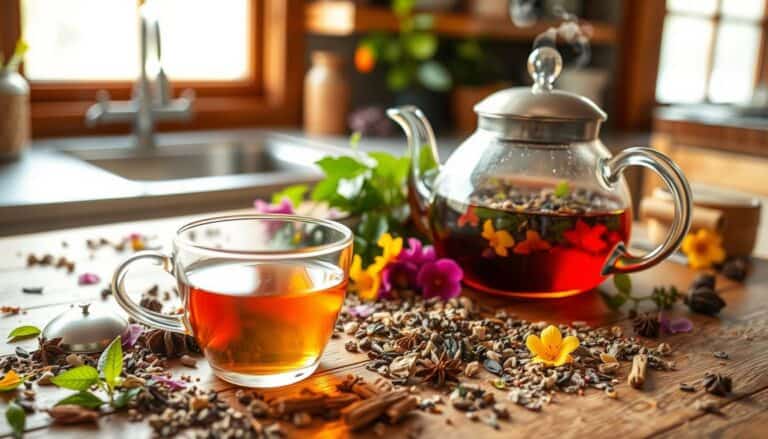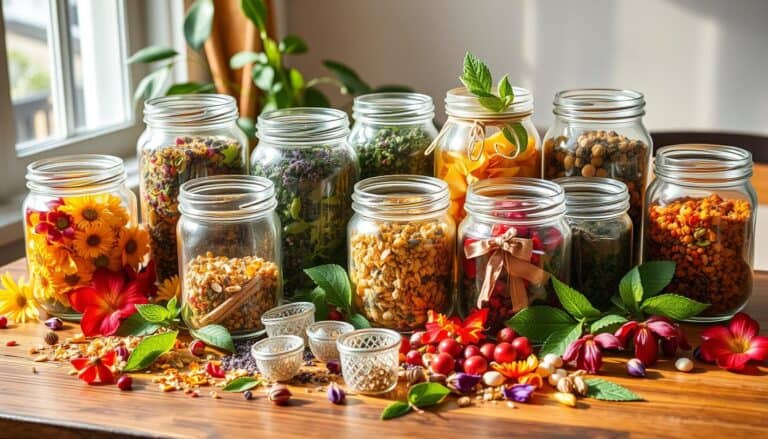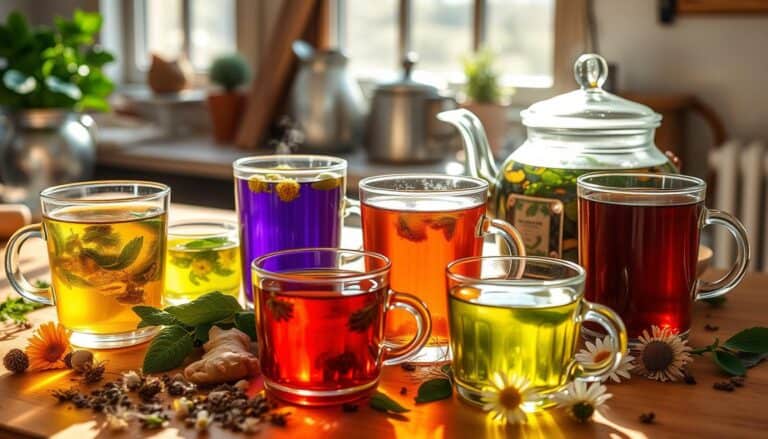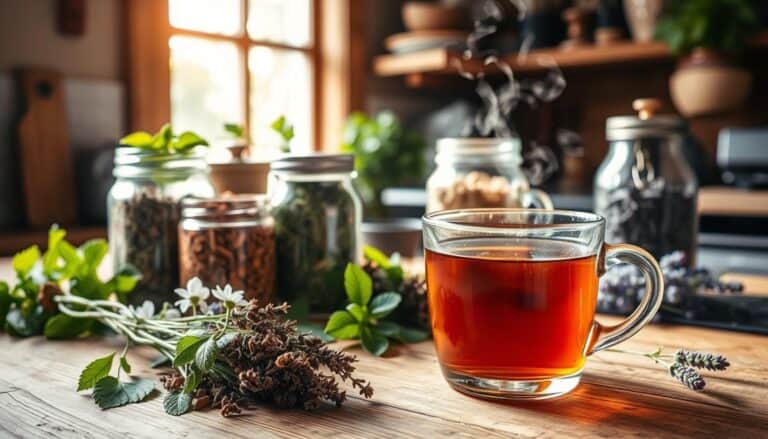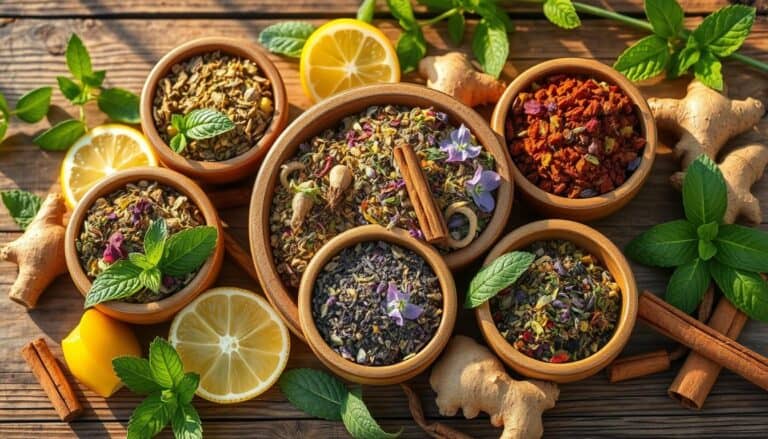18 Herbal Tea Blends for Weight Management
This post may contain affiliate links which means I may receive a commission for purchases made through links at no extra cost to you. I only recommend products I truly believe in. Thank you for your support!
Exploring natural ways to manage weight can change your life. Herbal tea is a great tool for boosting metabolism and wellness. It’s a tasty way to help you stay healthy.
Recent studies show how certain herbal teas can help with metabolism. Detox teas are more than just a trend. They are backed by science to aid in natural weight control.
Green tea catechins are known for their fat-burning abilities. They can target belly fat, making herbal tea a smart choice for your health.
Natural tea blends offer gentle support for metabolism. Unlike harsh chemicals, herbal teas nourish and may improve metabolic function.
Our guide covers 18 herbal tea blends for weight management. We’ll look at ingredients, brewing methods, and the science behind their benefits. These teas are more than a drink; they’re a key part of a healthy lifestyle.
Understanding the Role of Herbal Teas in Weight Management
Botanical infusions are now key in the wellness world. They help with weight management naturally. These drinks do more than just hydrate; they support your fitness journey.
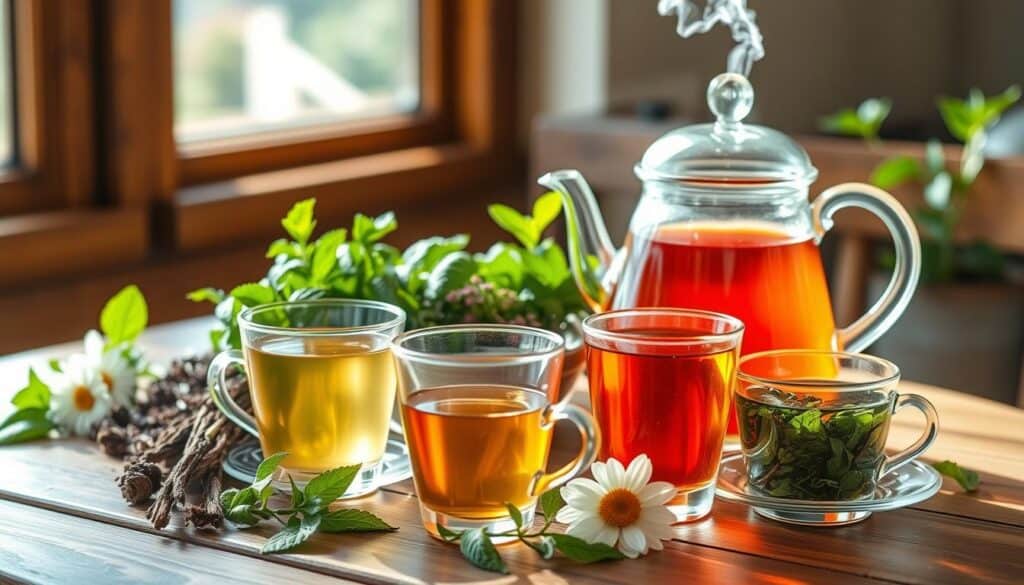
Research shows how wellness tonics can affect metabolism. Studies find that certain herbal ingredients can lead to weight loss.
The Science Behind Herbal Ingredients
Some herbal teas have compounds that affect our metabolism. Research points to their benefits:
- Catechins in green tea may boost metabolism by up to 4-5%
- Some teas can increase fat oxidation rates
- Specific herbal compounds may help block fat cell formation
How Herbal Teas Support Metabolism
Herbal teas offer metabolic support, backed by research. Studies show they can help with weight management:
| Tea Type | Potential Weight Loss | Duration |
|---|---|---|
| Green Tea | 3 pounds | 3 months |
| Oolong Tea | 2+ pounds | 6 weeks |
| White Tea | Fat cell breakdown | Ongoing |
Choosing the Right Tea for Your Goals
Choosing the right herbal tea depends on your health goals. Think about caffeine sensitivity, weight loss goals, and taste preferences. A healthcare professional can guide you.
Remember, herbal teas are not magic fixes. They are powerful tools in a weight management plan. Use them with balanced eating and exercise for best results.
Popular Herbal Ingredients for Weight Loss
Looking for natural ways to lose weight? Herbal teas are a great start. They can boost your metabolism and help with weight control. Let’s look at some top herbs for burning fat.
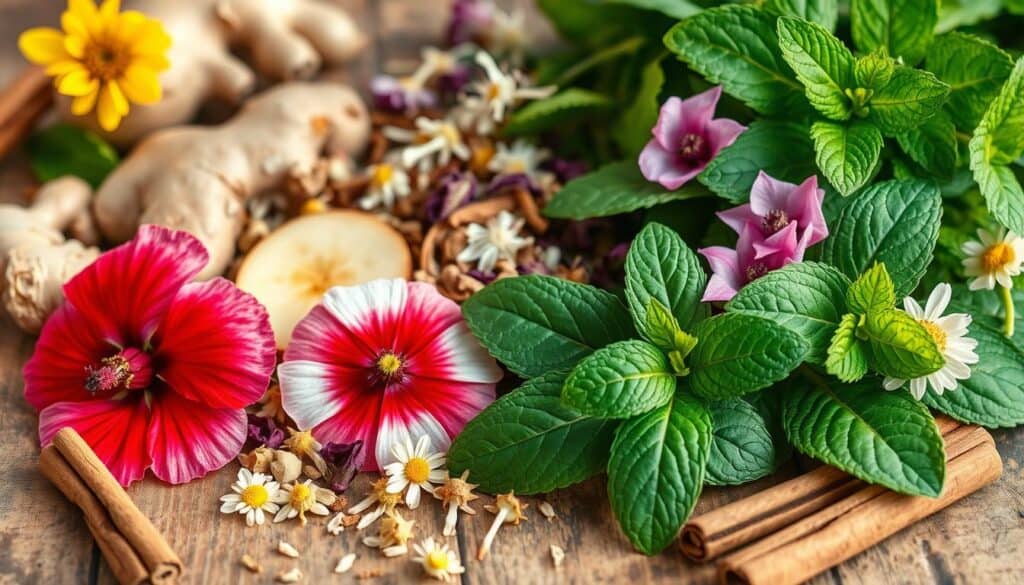
Green Tea: The Metabolism Booster
Green tea is a top choice for weight loss. It’s full of powerful compounds called polyphenols. These help speed up your metabolism and burn fat.
Catechins, the main active ingredients, kickstart thermogenesis. This means you burn more calories.
Peppermint: Appetite Management Herb
Peppermint is more than a tasty flavor. It can also curb your appetite and aid digestion. Studies show it may lower hunger and aid in weight management.
Ginger: The Thermogenic Powerhouse
Ginger is a fat-burning superstar. It boosts your metabolism and can increase calorie burning. Its natural compounds may also cut down fat absorption.
Cinnamon: Blood Sugar Regulator
Cinnamon is a key player in weight management. It helps control blood sugar, which can reduce cravings for sweets. Studies back up its benefits for metabolic health.
| Herb | Weight Loss Benefits | Recommended Daily Intake |
|---|---|---|
| Green Tea | Boosts metabolism | 2-3 cups daily |
| Peppermint | Reduces appetite | 1-2 cups daily |
| Ginger | Increases calorie burn | 1-2 grams daily |
| Cinnamon | Regulates blood sugar | 3 grams daily |
Mixing these herbal teas can be a natural way to manage weight. But, always talk to a doctor before trying new diets.
18 Herbal Tea Blends for Effective Weight Management
Discovering the right herbal tea blends can change your weight management journey. These detox tea recipes are more than a tasty drink. They offer natural support for your wellness goals.

Explore these powerful herbal tea blends. They can boost your metabolism and help with weight management:
-
Minty Green Detox Blend
This blend combines green tea’s metabolism boost with peppermint’s coolness. It cleanses your system and gives a gentle energy boost.
-
Spicy Ginger-Lemon Tea
This tea supports digestion with ginger and lemon’s zest. It boosts metabolism and offers a natural, invigorating drink.
-
Citrus-Fennel Refresh
This light blend reduces bloating and supports digestion. The mix of citrus and fennel makes a delicate yet powerful tea.
-
Turmeric-Cinnamon Power Brew
This blend combines turmeric’s anti-inflammatory with cinnamon’s blood sugar control. It’s a strong support for your wellness journey.
| Tea Blend | Key Benefits | Primary Ingredients |
|---|---|---|
| Minty Green Detox | Metabolism Boost | Green Tea, Peppermint |
| Spicy Ginger-Lemon | Digestive Support | Ginger, Lemon |
| Citrus-Fennel Refresh | Bloating Reduction | Citrus, Fennel |
| Turmeric-Cinnamon Brew | Anti-Inflammatory | Turmeric, Cinnamon |
Each herbal tea blend offers a unique way to support your weight management goals. They work best with a balanced diet and regular exercise.
How to Brew the Perfect Herbal Tea
Learning how to brew herbal tea can make your experience much better. It’s a mix of art and science. You need to pay attention to each tea’s special qualities.
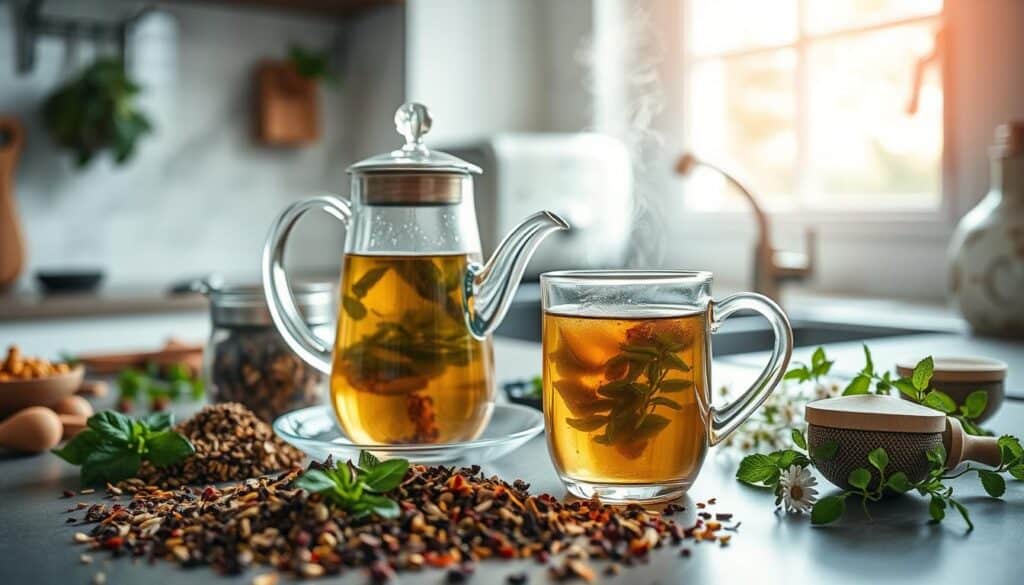
Exploring herbal teas opens up a world of flavors and ways to brew. Knowing how to prepare these teas can make your tea time even more special.
Water Temperature and Infusion Times
Getting the water temperature and steeping time just right is key. Different teas need different approaches:
- Delicate herbs like chamomile: 5-7 minutes steeping
- Robust herbs like mint: Up to 10 minutes steeping
- Ideal water temperature: Just below boiling point (195-205°F)
Loose Leaves vs. Tea Bags
Choosing between loose leaves and tea bags affects taste and health benefits. Loose-leaf teas are usually better:
- Higher concentration of active ingredients
- More robust flavor profile
- Greater flexibility in brewing
- Recommended ratio: One teaspoon per eight ounces of water
Enhancing Flavor with Natural Tea Sweeteners
Natural sweeteners can enhance your herbal tea without losing health benefits. Here are some options:
- Stevia: Zero-calorie plant-based sweetener
- Raw honey: Adds natural sweetness and potential health benefits
- Monk fruit extract: Another low-calorie natural alternative
Try out different brewing methods and sweeteners to find your favorite herbal tea. The most important thing is to enjoy the journey and savor each cup.
Incorporating Herbal Teas into Your Daily Routine
Starting your wellness journey can be easy with daily tea routines. In the United States, 75% of adults drink herbal teas for health reasons. Adding these drinks to your life can lead to better overall health.
https://www.youtube.com/watch?v=m3pbkbTEUcw
To make healthy habits with tea, you need a plan. Let’s see how to add herbal teas to your daily routine for wellness.
Best Times to Drink Herbal Tea
- Morning: Boost metabolism with energizing blends
- Pre-workout: Enhance exercise performance
- Afternoon: Curb snack cravings
- Evening: Promote relaxation and prevent nighttime eating
Pairing Herbal Teas with Healthy Meals
Pairing teas with meals can boost your nutrition. Here are some tips:
- Green tea with protein-rich breakfast
- Ginger tea alongside vegetable-based lunches
- Peppermint tea after light dinners
- Chamomile tea following balanced meals
Creating a Personalized Tea Ritual
Your tea ritual should match your wellness goals. Consistency is key for a routine that helps with weight and health.
Studies show 7 out of 10 people feel more energized and lose weight with herbal teas. By choosing the right teas and creating a personal ritual, you’re investing in your health.
What to Avoid When Using Herbal Teas for Weight Management
Exploring herbal tea cautions for weight management is key. Not all weight loss teas work the same. There’s no solid proof that herbal teas alone can help you lose weight.
Weight loss myths often make these teas seem like a magic fix. But the truth is more complex.
Some herbal teas can have side effects. Teas with laxatives like senna might cause muscle weakness. They can also mess with your bowel function.
Long-term use can lead to dehydration. It can also take away important minerals like sodium, potassium, and calcium.
Experts say healthy weight management needs a full plan. Herbal teas should add to a good diet and exercise, not replace them. Be careful about how they might affect your medicines.
Before trying any herbal tea, talk to a doctor. This is true for anyone under 18, older adults, or those with health issues. Quick fixes like tea aren’t the answer to lasting weight loss.
